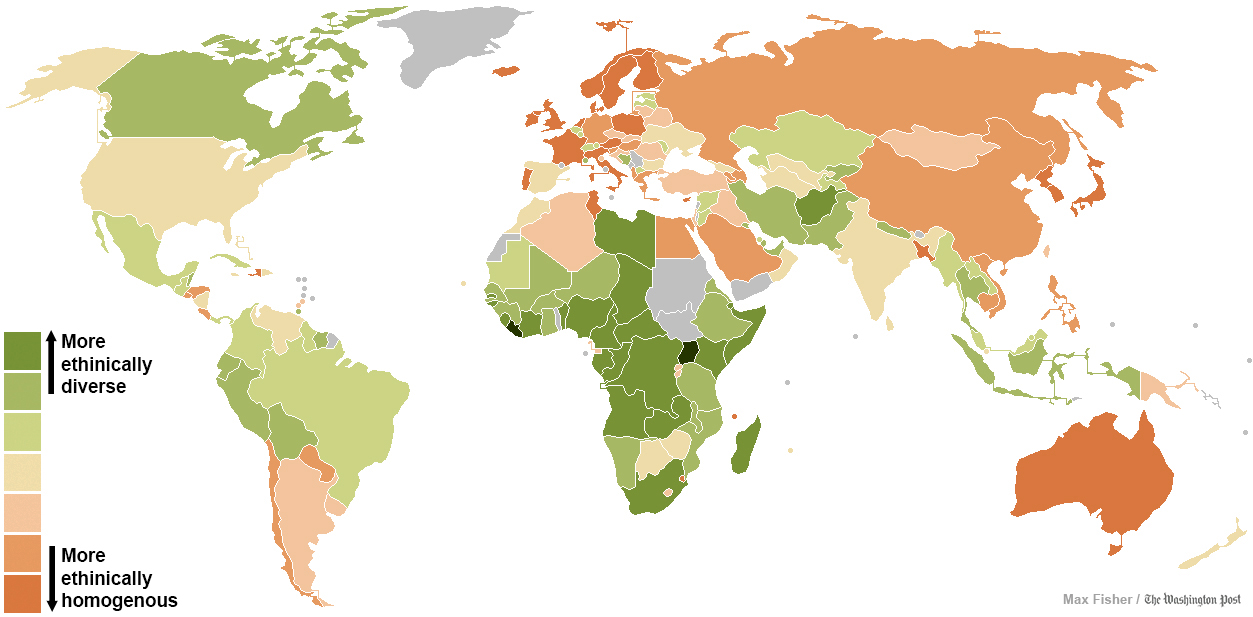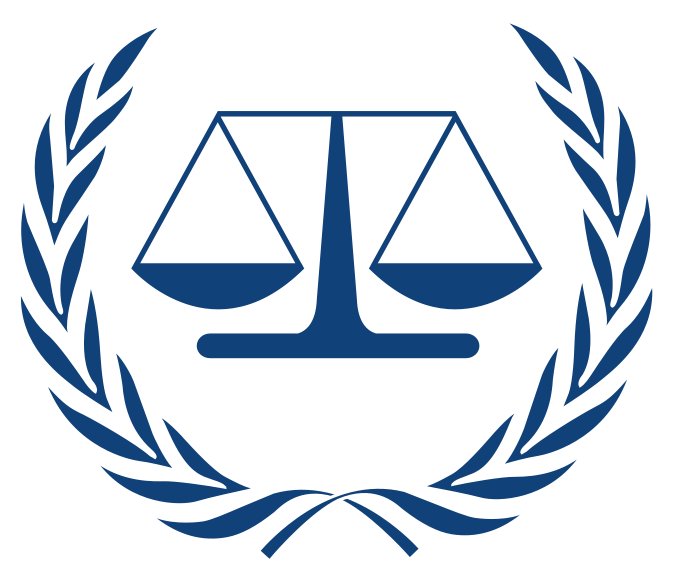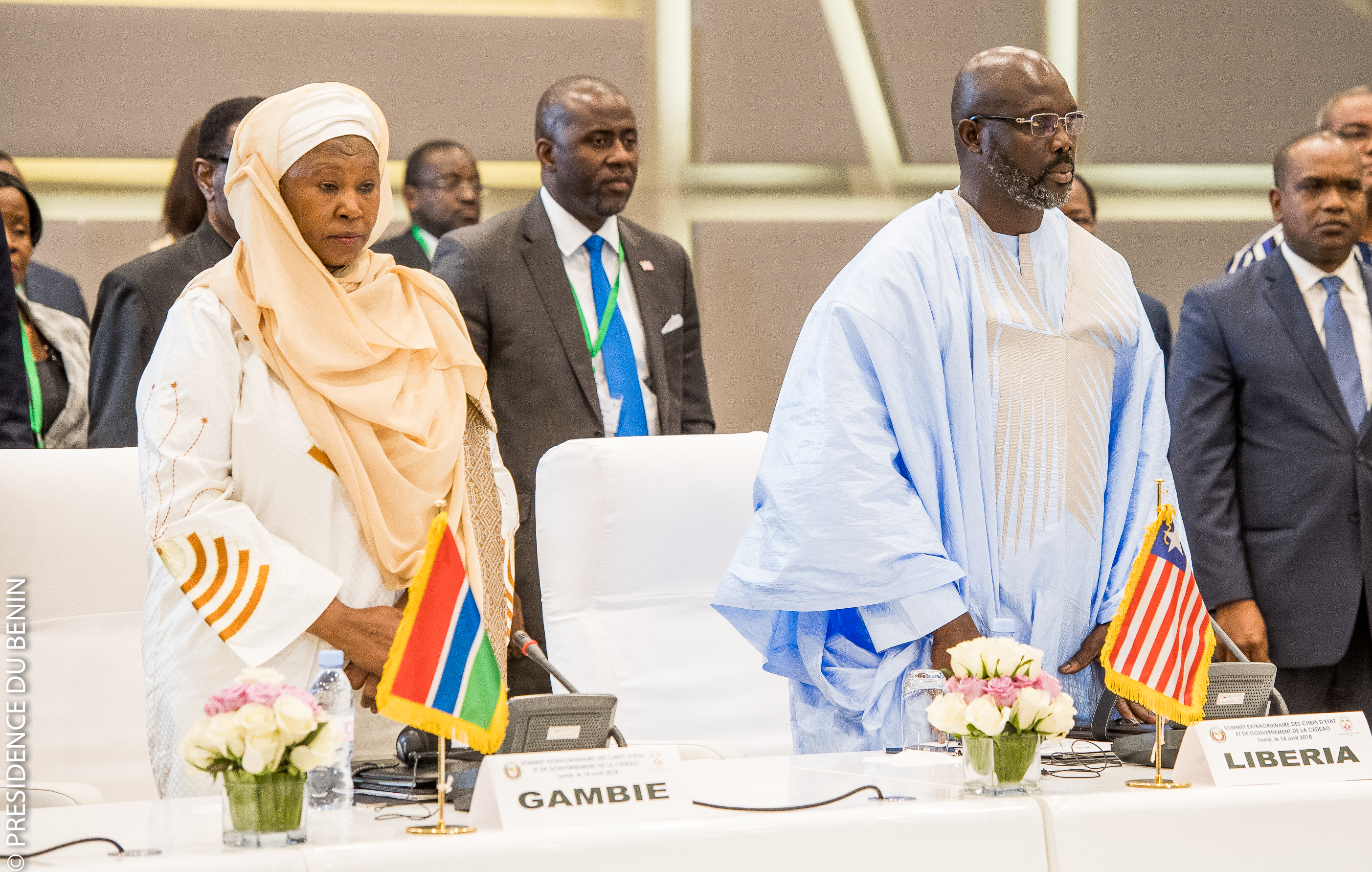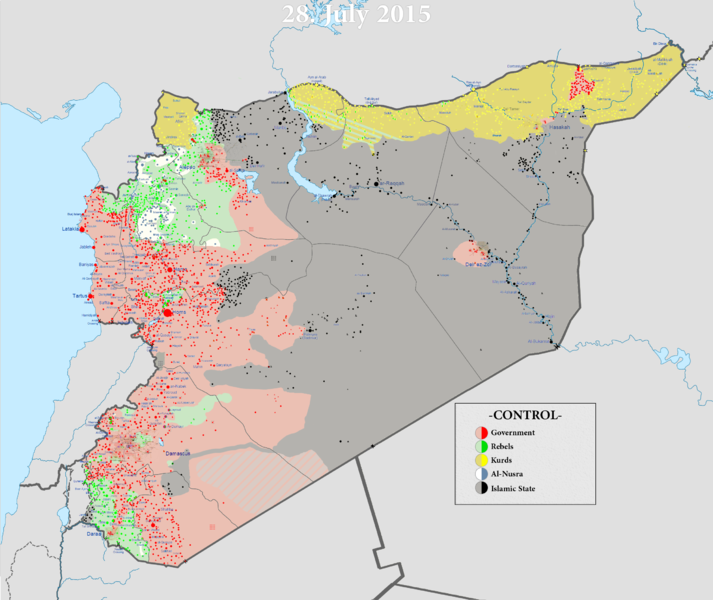I had intended to address the relationship between economic freedom and tolerance Max Fisher touched on in his recent post on world racial tolerance, but the piece pushed a couple of buttons that require a quick reaction.
To be clear, I am a big fan of Max Fisher and his infographics. They make me think, and I could always use more of that. He is also quite judicious in his post, noting that diversity and conflict do not line up neatly. And he does deploy the key “money quote”:
In general, it does not matter for our purposes whether ethnic differences reflect physical attributes of groups (skin color, facial features) or long-lasting social conventions (language, marriage within the group, cultural norms) or simple social definition (self-identification, identification by outsiders).* When people persistently identify with a particular group, they form potential interest groups that can be manipulated by political leaders, who often choose to mobilize some coalition of ethnic groups (“us”) to the exclusion of others (“them”). Politicians also sometimes can mobilize support by singling out some groups for persecution, where hatred of the minority group is complementary to some policy the politician wishes to pursue.
* I do appreciate the idea that the kind of identity does not matter so much (my view of ethnicity includes religion as well as race, language, and kinship as potential shared attributes that tie the group), although one could argue that certain kinds of divides have somewhat different dynamics.
This is why in my ethnic conflict classes I show both the classic Star Trek episode (black/white vs white/black) and the Babylon 5 episode where ethnicity is randomly assigned (purple vs. green) via scarves pulled out of a box. Ethnicity is not primordial (sorry, Robert Kaplan), but constructed with social and political meaning attached but changes over time due to politics and context. The money paragraph that Fisher quotes basically sets up the puzzles of the contemporary study of ethnic conflict: when do people support politicians who use identity to divide and coordinate and when do they not? Not all appeals based on ethnicity work (David Duke, anyone?).
So, heaps of good stuff in this piece, especially the end. I just want to address the instances of conventional wisdom that are problematic. That is, they are my pet peeves.
- Fisher cites the article discussing how Somalia’s identity politics changed after the civil war in 1991. This would be fine, except that Somalia has always been poorly understood. People often think that Somalia could be the one African country that could support secession and even be irredentist (seeking to annex neighboring territory inhabited by kin) because of its homogeneity (unless they have read my stuff). Somalis speak the same language, are all Muslim, are of the same race, and so on. But they were always divided by clan identity (kinship), which meant that the irredentism was always inconsistent. The leaders in Mogadishu would support the claims of some of the kin in some of the neighboring countries, depending on whether the kin had ties to politically relevant kin in Somalia. So, lots of irredentism targeting Somalis in Kenya, Ethiopia and Djibouti occurred in the early 1960s because then the electoral system required playing to a wider audience. In the mid to late 1970s, however, the irredentism only focused on the Ogaden clan residing in Ethiopia because its kin was a key partner in the authoritarian regime, while the clans tied to the Somalis in Kenya and Djibouti were not in the regime.
- Fisher and the folks he is citing are probably correct in that the focus since 1991 has probably moved to sub-clan identities. It is still kinship, but with smaller fractions so you get fighting between different sub-clans that belong to the same clan or clan-family rather than competition between clans or clan-families.
- Fisher does a great job of explaining ethnic fractionalization indexes. I wish I could communicate that concept as well. The problem with fractionalization is that it has been used poorly in the study of ethnic conflict and civil war. Two of the most productive and respected scholars in the field, Jim Fearon and David Laitin, wrote a very influential piece on civil war (3,500 citations!), and most of it is quite good. But when they seek to test whether ethnicity matters in the onset of violence, they use ethnic fractionalization as their indicator of whether ethnicity is relevant. They find it is not. The problem with this is there is very little work in the field on whether more diversity causes more conflict. What is the logic? Yes, one has to have more than one ethnicity to have ethnic conflict (not much ethnic conflict in South Korea), but beyond that? Not so clear.
- Tanzania is among the most diverse countries in the world with over a hundred different groups, but has had very little conflict. Why? Well, in part, no one group is big enough perhaps to dominate the rest? (I am guessing a bit here since my knowledge of Tanzania is thin).
- What might be related to ethnic conflict and civil war is the square of ethnic fractionalization. That is, in societies with very little diversity there is no opportunity for violence. For societies where this is a great deal, there is no threat of dominance. But in places where there are a few groups that rival each other, then the threats they pose to each other, or at least one to the others, can be severe. Ethnic violence may not be about fractionalization/diversity but about polarization.
- The one consistent finding for ethnic conflict is not about fractionalization but about group concentration. That where ethnic groups have distinct areas apart from each other within a country, there is more conflict. Why? Well, partly because it facilitates separatism. Partly because groups that are separate have a secure base from which to launch attacks. Partly because intermingled groups may be deterred from attacking since they themselves are vulnerable (kind of like mutual assured destruction).
I look forward to more maps and other graphics at the Washington Post. They get my juices flowing on this stuff, when I have been focusing elsewhere the past several years.
And I will get to the economic freedom/tolerance stuff tomorrow.
A version of this piece was first posted at Steve Saideman’s blog.









2 comments
I took a quick look into the well-known civil war data to test your conjecture about the square of ethnic fractionalization. I don’t find any evidence. See my post for details (reproducible if you’re interested in going further).
http://justinmurphy.wordpress.com/2013/05/22/civil-war-and-the-square-of-ethnic-fractionalization-4/